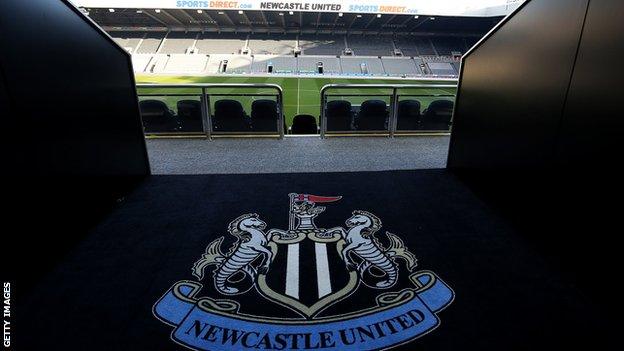Newcastle takeover: Saudi Arabia appeals against World Trade Organization piracy ruling
- Published

A proposed £300m Newcastle takeover deal is 80% financed by Saudi Arabia's Public Investment Fund
Saudi Arabia has appealed against a landmark piracy ruling, posing further questions over the proposed takeover of Newcastle United.
Last month the World Trade Organization issued a report which found representatives of the Saudi state had facilitated the breach of international piracy laws via the TV network beoutQ.
BeoutQ has been accused of illegally broadcasting a range of professional sport, including Premier League matches.
Saudi Arabia initially claimed the WTO's ruling was a vindication of its position, but the WTO confirmed to BBC Sport it has since received an appeal against it.
The rights to show Premier League games in the Middle East belong to Qatar-based beIN Sports, who are in the middle of a three-year deal with the Premier League worth £400m.
In the letter sent to the WTO, which has been seen by BBC Sport, the Saudi ambassador to the WTO, Saleh Al Husseini, says complainants Qatar had failed to establish a case that beoutQ was operated by individuals or entities subject to Saudi criminal jurisdiction.
It also denies that Saudi authorities had enough evidence, before the WTO panel investigated, to apply criminal sanctions to those behind beoutQ, and that it prevented beIN from taking legal action to enforce its rights in Saudi courts.
The proposed £300m deal to take over Newcastle is 80% financed by Saudi Arabia's Public Investment Fund, whose chairman is Crown Prince Mohammed bin Salman.
It is currently awaiting approval through the Premier League's owners' and directors' test, which has been assessing the background of the club's prospective owners for 16 weeks.
BBC Sport has learned that the delay has resulted from a lack of clarity over who would hold ultimate responsibility at the club.
Saudi Arabia has always denied aiding the beoutQ operation and has insisted there is no link between its government and the alleged piracy.
But in its ruling last month, the WTO found that Saudi Arabia had facilitated the beoutQ operation and had "acted in a manner inconsistent" with international law protecting intellectual property rights.
The WTO also called for the country to "bring its measures into conformity with its obligations" under international law.
Following the WTO report, Premier League chief executive Richard Masters said: "What the Premier League wants to do off the back our own efforts and the efforts of other sports is for Saudi Arabia to respond positively to the situation and to allow sports rights holders to protect their rights."
Since then, Saudi Arabia has barred barred beIN Sports from operating in the kingdom, meaning there is no legal means of watching Premier League football in the country.
Responding to the WTO appeal, a beIN Sports spokesperson said: "Having spent the past six weeks telling the world how the WTO ruling was a complete vindication of the kingdom, curiously Saudi Arabia is now appealing a case they say they emphatically won.
"Rather than positively complying with international law, it has said the Premier League, Fifa and Uefa sent their legal case to the wrong Saudi email address nine times, it has permanently banned the Premier League's broadcast partner meaning the only way to watch premium sport is via piracy and and now it is appealing a WTO decision that they said they won.
"All the while, Saudi Arabia is essentially trying to pass an honesty and an anti-piracy test under the Premier League's rules, and gain the trust of the international sports community."